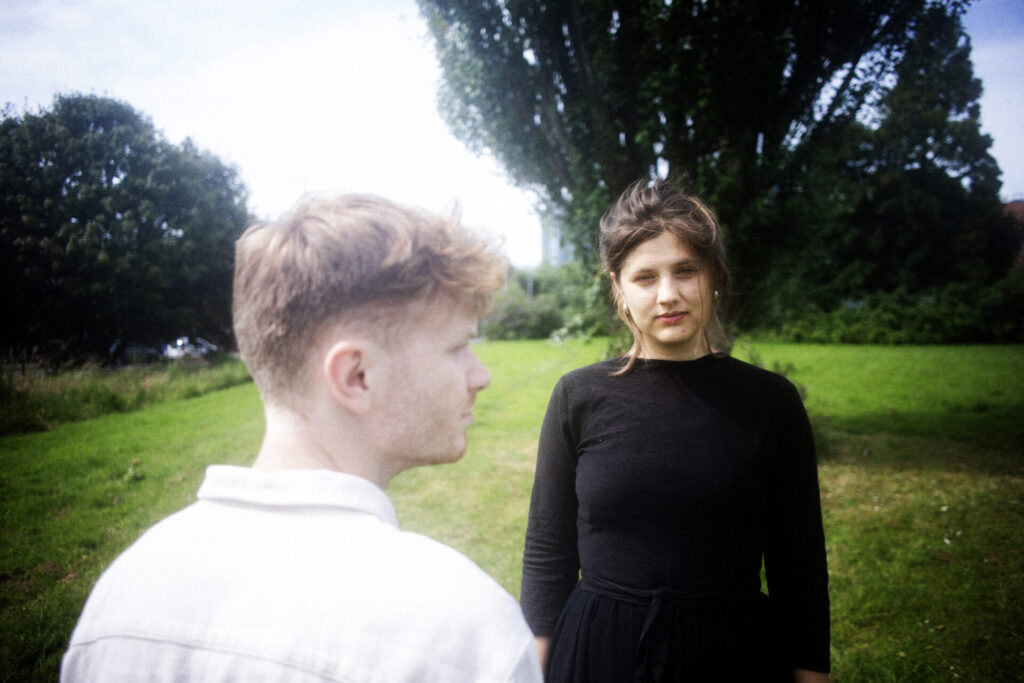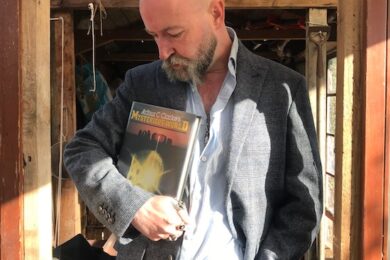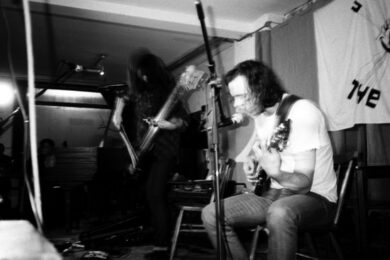Lower case titles, allusions to dreams, and descriptors like ‘introspective’ and ‘fragmentary’ – the ostensible building blocks of Lili Holland-Fricke and Sean Rogan’s dear alien are well-worn to the point of cliché in contemporary music that straddles the false dichotomy of pop and underground music. It’s a wonder, then, to find that these Manchester-based musicians’ debut collaborative album is an unexpected take on the meeting of improvised sound and avant-songwriting, buzzing with a quiet energy that both shields the listener from and submerges them in a distinctively contemporary discomfort.
Emerging from the world of contemporary classical music, Holland-Fricke is primarily a cellist, whereas Rogan is a prolific guitarist and producer. The duo first worked together when Rogan produced Holland-Fricke’s 2022 EP birdsong for breakfast, and both take on porous roles on dear alien, a ‘50/50 collaboration’ which sees them experiment with electronics, vocals, lyricism, tape loops and sound design alongside their primary instruments. Recorded over a two-week residency period in Greenwich, the album’s eight songs reflect their origins as improvisations, as well as the intimate and intense situation in which they were recorded.
Their tight musical kinship is introduced on opener ‘at first’, on which they sing a strange folk-like melody in tandem over a drone – the two parts more siblings than twins, drifting off and then locking back together. It’s one of a handful of tracks on the album with lyrics, snatches of phrases imbued with dream logic (“In a daydream at first / Kneeling of course / Cornered I’ll take flight / Left that ground behind”). Even more hazily impressionistic is ‘seem asleep’, which is adapted from Holland-Fricke’s notebooks and diaries, compiling otherwise unrelated lines into an imaginary cut-up narrative (“Wanted to seem asleep / Clocks change / To green”) set in the space between sleep and waking life. The mood is gentle and the production spacious, but not necessarily comforting. Holland-Fricke and Rogan’s vocals drop in and out, like fitful dreaming, and are eventually subsumed into an eerie tape loop of vocalisations and distorted cello.
It’s this tension between gentleness and unease which defines dear alien, a perpetual battle between bodily and psychological states that feels constant in contemporary life. It’s at the heart of ‘slow thing’, in which slowness doesn’t evoke calm, and is more akin to the protracted pain of a peeling plaster. Pin-pricks of Rogan’s high-pitched guitar punctuate Holland-Fricke’s cello half-melody, which dissolves into an aching, bending glissando. The whole thing is eventually wrapped in a layer of rustling static, an electronic beep suggesting a heart monitor or an urgent buzz at the door. ‘half blue’ also sees instrumentation coddled by electronics. At first, Holland-Fricke’s cello is lonely and exposed, but becomes subsumed by trembling rattles, and a constant guitar strum treated to sound like a buzzing cloud.
The most starkly disquieting track is arguably ‘dawning’, a series of cello blasts treated with vocodor that are separated by fluctuating breaks of silence. Each time the cello comes back in, the note has changed pitch and intensity, unpredictable like a jumpscare, or an auto-refreshing rolling news feed. The title feels deeply ironic: instead of the gradual introduction of the dawn, the brightness of Holland-Fricke’s cello is immediate and relentless. Under a minute long, ‘worse than before’ is a series of reserved percussive cello hits, more predictably metronomic but still unnerving in the way Rogan’s production captures the unadorned physicality of Holland-Fricke’s playing. Both musicians’ approach to their primary instrument is unconventional and expansive – Rogan’s electric guitar tones are varied and malleable – but Holland-Fricke’s commitment to wringing every possibility from her cello is particularly notable, from her extensive use of pedals to the range of timbres she achieves from varied playing techniques.
The duo’s avant-pop aesthetic is most vividly represented on the album’s title track. Beginning as a kind of self-performed duet between Holland-Fricke’s sharp cello strikes and tentative, auto-tuned vocals – both equally lyrical and plaintive – it soon breaks into a bright cacophony of beats and electronic squiggles, in the closest the album gets to danceable music. When Holland-Fricke’s cello and voice return they’re transformed, more wonky and appropriately alien. Lots of experimental artists are currently using auto-tune and vocodor effects on their vocals – many after More Eaze and claire rousay’s notable use of the effects on their excellent 2022 avant-pop record Never Stop Texting Me – but here it feels intentional rather than trendy, especially in the context of the use of pedals over the whole album.
On the final track, ‘for a.r.’, the context for this kaleidoscopic, exploratory album clicks into place. The ‘a.r.’ in question is of course Arthur Russell, another radical cello player who boldly incorporated his instrument into experimental and pop compositions. Here, Holland-Fricke’s cello strikes meld into Rogan’s strumming, accompanying a muddled field recording of what sounds like a conversation in a garden, the sound of chirping birds circling half-heard laughs and spoken cadences. It’s the most plainly optimistic-sounding track on the record, and as a tribute to Russell it touches on his experimental bow technique and his centring of community and connection within his music. Holland-Fricke and Rogan may not yet be as accomplished as their shared hero, but their inventive approach is already proving fruitful. dear alien is an endlessly intriguing, thoughtful debut collaboration, and they could well be on their way to something miraculous.






